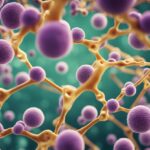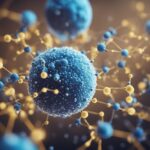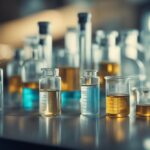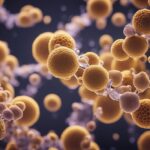As we age, our bodies undergo a series of changes that can lead to a decline in overall health and well-being. One of the key factors in this process is the gradual depletion of a molecule called nicotinamide adenine dinucleotide (NAD+). This molecule plays a critical role in many cellular processes, including DNA repair, energy production, and immune function. As NAD+ levels decline, our cells become less efficient and more susceptible to damage, which can contribute to the aging process.
To combat this decline, researchers have been exploring the use of NAD+ boosters as a potential anti-aging strategy. These compounds are designed to increase NAD+ levels in the body, thereby improving cellular function and potentially slowing down the aging process. While the scientific basis for NAD+ boosters is still being explored, early research has shown promising results, leading to increased interest in these compounds among the general public.
Despite the growing interest in NAD+ boosters, there are still many questions surrounding their safety and efficacy. In this article, we’ll take a closer look at the scientific basis for NAD+ boosters, the different types of compounds available, and the potential benefits and risks associated with their use. We’ll also explore natural sources of NAD+ boosters and lifestyle factors that can influence NAD+ levels, as well as emerging research in this field. Finally, we’ll provide some tips for integrating NAD+ boosters into your daily regimen and answer some frequently asked questions about these compounds.
Key Takeaways
- NAD+ boosters may help combat age-related decline by increasing NAD+ levels in the body.
- There are different types of NAD+ boosters available, including natural sources and pharmacological enhancers.
- While early research is promising, more studies are needed to fully understand the safety and efficacy of NAD+ boosters.
Understanding NAD+ and Its Role in Aging

NAD+ (Nicotinamide Adenine Dinucleotide) is a coenzyme found in all living cells. It plays a crucial role in many cellular processes, including energy metabolism, DNA repair, and gene expression. NAD+ levels decline with age, and this decline has been linked to several age-related diseases, including Alzheimer’s, Parkinson’s, and cardiovascular disease.
NAD+ boosters, also known as NAD+ precursors, are compounds that increase NAD+ levels in the body. These compounds work by providing the body with the building blocks it needs to produce NAD+. The most common NAD+ boosters are nicotinamide riboside (NR) and nicotinamide mononucleotide (NMN).
Studies have shown that NAD+ boosters can have anti-aging effects. For example, a study published in the journal Cell Metabolism found that NR supplementation improved muscle function in older mice. Another study found that NMN supplementation improved glucose tolerance and insulin sensitivity in older mice.
While the research on NAD+ boosters is still in its early stages, many scientists believe that these compounds have the potential to improve health and extend lifespan. However, more research is needed to fully understand the effects of NAD+ boosters on human health.
In conclusion, NAD+ is a critical coenzyme that declines with age and is linked to several age-related diseases. NAD+ boosters, such as NR and NMN, have shown promise in improving health and extending lifespan in animal studies. While more research is needed, NAD+ boosters may be a promising tool for anti-aging interventions.
Scientific Basis of NAD+ Boosters
NAD+ boosters have gained popularity in recent years due to their potential anti-aging effects. The scientific basis for their effectiveness lies in their ability to increase the levels of nicotinamide adenine dinucleotide (NAD+) in the body. NAD+ is a coenzyme that plays a crucial role in various cellular processes, including energy metabolism, DNA repair, and cell survival.
Enzymatic Functions and Sirtuins
NAD+ is a critical cofactor for enzymes involved in energy metabolism, including the citric acid cycle and oxidative phosphorylation. In addition, NAD+ is also required for the activity of sirtuins, a family of enzymes that regulate various cellular processes, including gene expression, DNA repair, and cell survival. Sirtuins are involved in regulating the aging process, and their activity is dependent on the levels of NAD+. By increasing the levels of NAD+, NAD+ boosters can potentially enhance the activity of sirtuins, leading to improved cellular function and potentially delaying the aging process.
DNA Repair and Cell Viability
NAD+ is also essential for DNA repair and cell viability. It is required for the activity of PARP enzymes, which play a critical role in repairing DNA damage. In addition, NAD+ is also involved in regulating cell survival pathways, including the activation of sirtuins, which can promote cell survival and prevent cell death. By increasing the levels of NAD+, NAD+ boosters can potentially enhance DNA repair and promote cell survival, leading to improved cellular function and potentially delaying the aging process.
Overall, the scientific basis for the effectiveness of NAD+ boosters lies in their ability to increase the levels of NAD+ in the body, which can enhance various cellular processes, including energy metabolism, DNA repair, and cell survival. While more research is needed to fully understand the potential anti-aging effects of NAD+ boosters, the existing evidence suggests that they may hold promise as a potential anti-aging intervention.
Natural Sources of NAD+ Boosters
NAD+ boosters can be found in various natural sources such as food, vitamins, and minerals. Here are some of the most common natural sources of NAD+ boosters:
Dietary Components
Certain dietary components can increase the levels of NAD+ in the body. One such component is tryptophan, an amino acid found in protein-rich foods such as meat, fish, and eggs. Tryptophan is a precursor to NAD+ and can be converted into it through a series of enzymatic reactions.
Another dietary component that can boost NAD+ levels is nicotinamide riboside (NR). NR is a form of vitamin B3 found in small amounts in milk and other dairy products. It can also be taken as a supplement.
Vitamins and Minerals
Several vitamins and minerals are essential for the production of NAD+. One of the most important is vitamin B3, also known as niacin. Niacin is found in many foods, including meat, fish, and whole grains. It can also be taken as a supplement.
Other vitamins and minerals that can boost NAD+ levels include vitamin B6, vitamin B12, and zinc. These nutrients are found in a variety of foods, including meat, fish, dairy products, and whole grains.
Overall, incorporating these natural sources of NAD+ boosters into one’s diet can help support healthy aging and promote overall wellness.
Pharmacological NAD+ Enhancers

Supplements
Supplements that boost NAD+ levels have gained popularity in recent years. These supplements contain precursors to NAD+ such as nicotinamide riboside (NR) and nicotinamide mononucleotide (NMN). NR and NMN are converted into NAD+ in the body, thereby increasing NAD+ levels.
Studies have shown that these supplements can increase NAD+ levels in humans and animals. However, the long-term effects of these supplements on human health are still unknown. Additionally, the quality and purity of these supplements can vary, so it is important to purchase from reputable sources.
Prescription Drugs
Pharmacological NAD+ enhancers are also available in the form of prescription drugs. These drugs work by inhibiting enzymes that consume NAD+ or by increasing the production of NAD+.
One such drug is nicotinamide riboside chloride (NRC), which has been shown to increase NAD+ levels in humans. Another drug, FK866, inhibits an enzyme called NAMPT, which is involved in the NAD+ recycling pathway.
However, it is important to note that these drugs are still in the experimental stage and their long-term effects on human health are not yet known. They are also not currently approved for anti-aging purposes by regulatory agencies such as the FDA.
In summary, pharmacological NAD+ enhancers such as supplements and prescription drugs have shown promising results in increasing NAD+ levels. However, more research is needed to determine their long-term effects on human health before they can be widely recommended for anti-aging purposes.
Lifestyle Factors Influencing NAD+ Levels

NAD+ levels can be influenced by various lifestyle factors. These factors can affect the body’s ability to produce NAD+ and can lead to a decline in NAD+ levels. Here are some of the lifestyle factors that can influence NAD+ levels:
Exercise
Regular exercise has been shown to increase NAD+ levels in the body. Exercise can stimulate the production of a protein called PGC-1α, which in turn increases the production of NAD+. Exercise also helps to improve mitochondrial function, which is important for NAD+ production.
Sleep Patterns
Sleep is essential for the body to repair and regenerate. Lack of sleep can lead to a decrease in NAD+ levels. Studies have shown that sleep deprivation can lead to a decrease in NAD+ levels and an increase in oxidative stress. It is important to get enough sleep to maintain healthy NAD+ levels.
Stress Management
Stress can have a negative impact on NAD+ levels. Chronic stress can lead to a decrease in NAD+ levels and an increase in oxidative stress. Stress management techniques such as meditation and yoga can help to reduce stress and improve NAD+ levels.
In conclusion, lifestyle factors such as exercise, sleep patterns, and stress management can have a significant impact on NAD+ levels. It is important to maintain a healthy lifestyle to support NAD+ production and maintain optimal health.
Emerging Research on NAD+ Boosters

Clinical Trials
Several clinical trials have been conducted to study the potential benefits of NAD+ boosters for anti-aging. One such study published in the journal Nature Communications found that a daily dose of 1,000 mg of nicotinamide riboside (NR), a form of vitamin B3 and an NAD+ precursor, increased NAD+ levels in humans by 60% after just one week of supplementation. This increase in NAD+ was associated with improved mitochondrial function and enhanced muscle performance.
Another clinical trial published in the journal Aging Cell investigated the effects of a combination of NR and pterostilbene, a compound found in blueberries and grapes, on NAD+ levels and muscle function in older adults. The study found that the combination significantly increased NAD+ levels and improved muscle function compared to a placebo.
Longevity Studies
In addition to clinical trials, several longevity studies have also been conducted to investigate the potential anti-aging effects of NAD+ boosters. One such study published in the journal Cell Reports found that increasing NAD+ levels in mice using a precursor called nicotinamide mononucleotide (NMN) improved their mitochondrial function and increased their lifespan.
Another study published in the journal Nature Communications investigated the effects of NMN supplementation on age-related metabolic dysfunction in mice. The study found that NMN supplementation improved glucose intolerance, insulin sensitivity, and lipid metabolism in the mice, suggesting that NAD+ boosters may have potential as a treatment for age-related metabolic disorders.
Overall, emerging research suggests that NAD+ boosters may have the potential to improve mitochondrial function, enhance muscle performance, and potentially extend lifespan. However, more research is needed to fully understand the long-term effects and safety of NAD+ boosters in humans.
Safety and Efficacy of NAD+ Boosters
Recommended Dosages
NAD+ boosters are generally considered safe when taken at recommended dosages. The optimal dosage may vary depending on the individual’s age, health status, and other factors. It is recommended to start with a low dosage and gradually increase it over time to minimize the risk of potential side effects.
The recommended dosages of NAD+ boosters may differ depending on the specific product. For example, nicotinamide riboside (NR) is typically taken at a dosage of 250-500 mg per day, while nicotinamide mononucleotide (NMN) is often taken at a dosage of 125-250 mg per day.
Potential Side Effects
NAD+ boosters are generally well-tolerated, but some individuals may experience side effects. The most common side effects reported include gastrointestinal discomfort, such as nausea, diarrhea, and abdominal pain. These side effects are usually mild and subside within a few days of discontinuing the supplement.
There is limited research on the long-term safety of NAD+ boosters, and more studies are needed to evaluate their safety and efficacy. It is important to consult with a healthcare professional before taking any supplements, especially if you have a pre-existing medical condition or are taking medications.
In summary, NAD+ boosters are generally safe and well-tolerated when taken at recommended dosages. However, more research is needed to fully evaluate their long-term safety and efficacy. As with any supplement, it is important to consult with a healthcare professional before taking NAD+ boosters.
Integrating NAD+ Boosters into Daily Regimen
Integrating NAD+ boosters into a daily regimen can be an effective way to combat the effects of aging. NAD+ boosters can help improve cellular function, boost energy levels, and enhance overall health.
When it comes to choosing a NAD+ booster, it is important to consider the quality of the supplement. Look for a reputable brand that uses high-quality ingredients and has been tested for purity and potency.
One way to integrate NAD+ boosters into a daily regimen is to take them as part of a daily supplement routine. Many NAD+ boosters come in capsule or tablet form, making them easy to take alongside other supplements.
Another way to incorporate NAD+ boosters into a daily routine is to use a topical cream or serum. These products can be applied directly to the skin and can help improve the appearance of fine lines and wrinkles.
In addition to taking NAD+ boosters, it is important to maintain a healthy lifestyle. This includes eating a balanced diet, getting regular exercise, and getting enough sleep. By taking care of the body as a whole, NAD+ boosters can work even more effectively to combat the effects of aging.
Overall, integrating NAD+ boosters into a daily regimen can be an effective way to enhance overall health and combat the effects of aging. By choosing a high-quality supplement and maintaining a healthy lifestyle, individuals can experience the benefits of NAD+ boosters for anti-aging purposes.
Frequently Asked Questions
What are the potential benefits of taking NAD+ supplements for anti-aging?
NAD+ supplements are known to have a range of potential benefits for anti-aging. These supplements can help to improve cellular metabolism, regulate gene expression, and enhance DNA repair. They may also help to reduce inflammation, boost energy levels, and improve cognitive function. Additionally, NAD+ supplements have been shown to support healthy aging by promoting the health of various organs and tissues in the body.
What side effects might one experience with NAD+ supplementation?
While NAD+ supplements are generally considered safe, some people may experience side effects. These can include nausea, fatigue, headaches, and flushing. In rare cases, high doses of NAD+ supplements may cause liver damage or other serious health problems. It is important to speak with a healthcare provider before starting any new supplement regimen, especially if you have a pre-existing medical condition or are taking other medications.
At what age is it appropriate to start using NAD+ boosters?
There is no specific age at which it is appropriate to start using NAD+ boosters. However, many people begin to experience age-related declines in NAD+ levels in their 30s and 40s. As such, some experts recommend starting NAD+ supplementation in your 40s or 50s to help support healthy aging.
Are there any risks associated with long-term use of NAD+ supplements?
While there is limited research on the long-term effects of NAD+ supplementation, some experts have raised concerns about the potential risks of prolonged use. High doses of NAD+ supplements may cause liver damage or other serious health problems, and some studies have suggested that long-term use may increase the risk of cancer. It is important to speak with a healthcare provider before starting any new supplement regimen, especially if you plan to use it long-term.
Which NAD+ supplements are considered the most effective for anti-aging purposes?
There are several different types of NAD+ supplements available, including nicotinamide riboside (NR), nicotinamide mononucleotide (NMN), and nicotinamide adenine dinucleotide (NAD+). While all of these supplements have been shown to support healthy aging to some degree, NMN and NR are currently considered the most effective for anti-aging purposes. These supplements have been shown to increase NAD+ levels in the body and improve various markers of health and longevity.
How do NAD+ boosters compare to other anti-aging supplements on the market?
NAD+ boosters are just one of many different types of anti-aging supplements available on the market. While there is limited research comparing the effectiveness of different supplements, some experts believe that NAD+ boosters may be among the most promising for supporting healthy aging. However, it is important to note that no supplement can completely reverse or stop the aging process, and that a healthy lifestyle is still the most important factor in promoting longevity and well-being.










